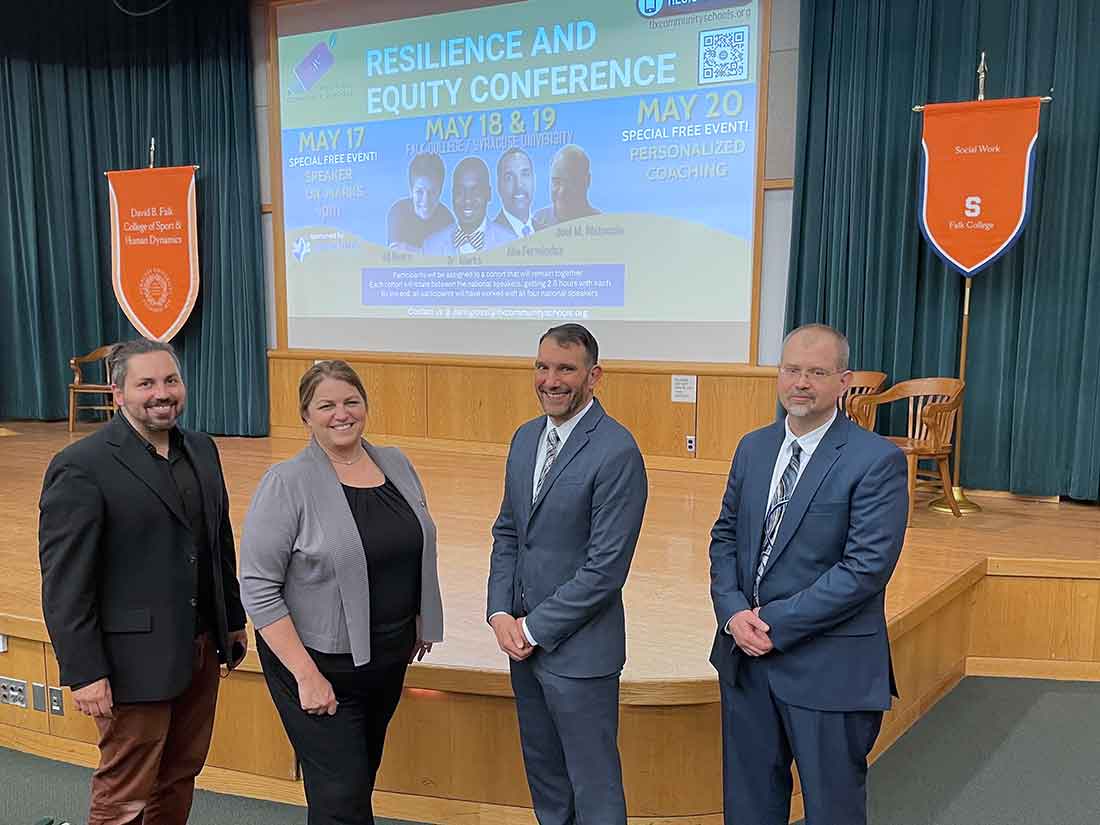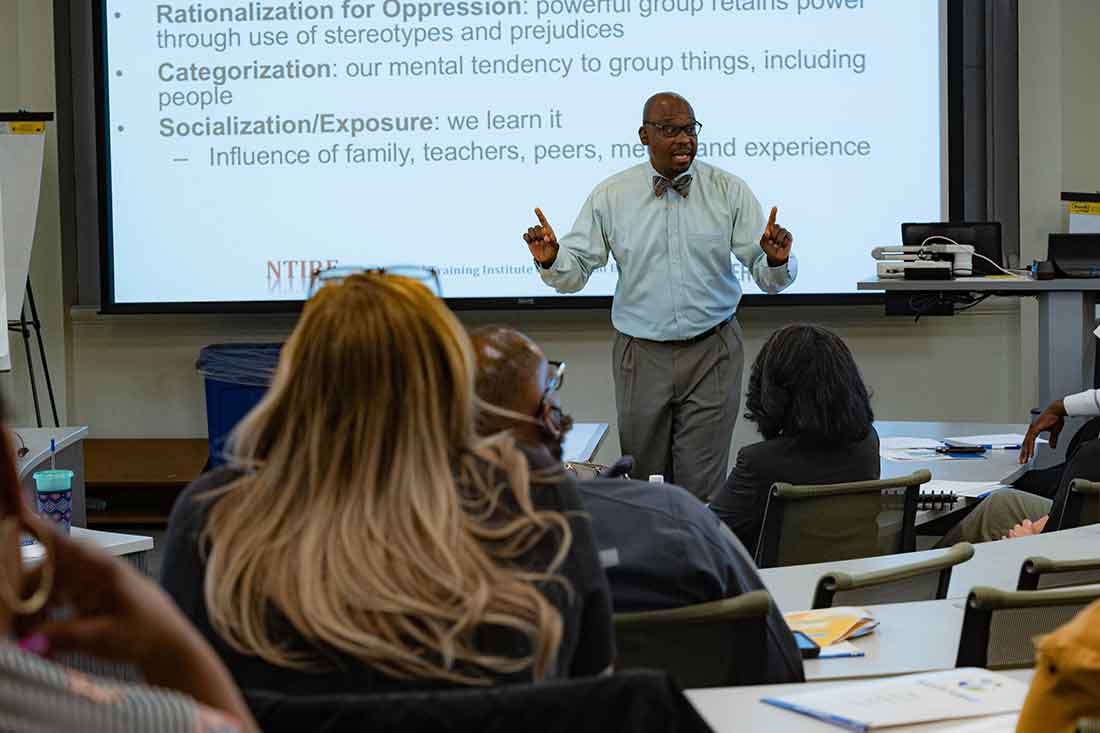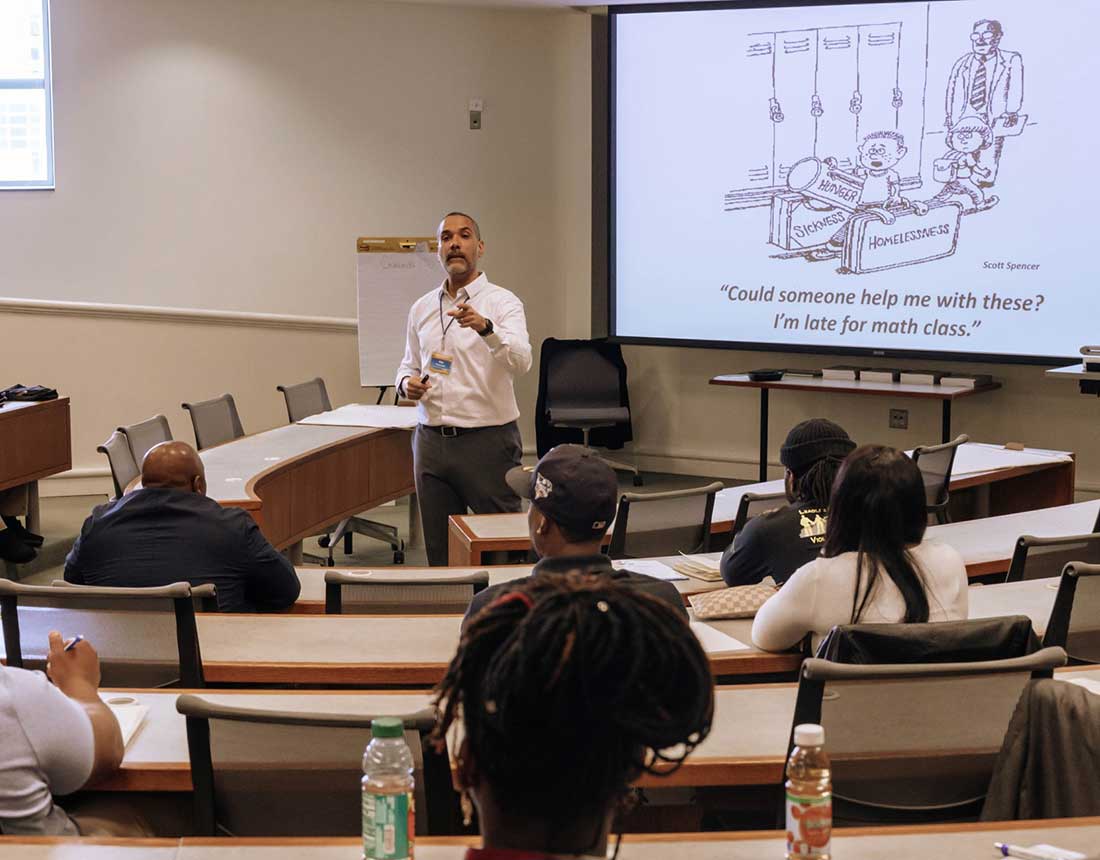
Social workers, teachers, staff and administrators from schools and school districts across Central New York filled the halls of Falk College this past spring for the inaugural Resilience and Equity Conference created by Finger Lakes Community Schools and sponsored by Falk College and Peaceful Schools. Together, conference participants addressed some of the most pressing challenges facing young people, the communities in which they live, and the schools in which they learn.
“This conference is an opportunity for us to think deeply about our role as individuals and as leaders in how to disrupt the structures of oppression, racism and hate that continue to impose themselves on our children and threaten our children’s children,” says Dr. Lura Lunkenheimer, president of Peaceful Schools.
“We do not need to look far to see the injustice, inequality and pain some of our young people are facing,” adds Ryan Heath, assistant professor of social work in Falk College. “We see youth violence and gun violence. We see trauma—from COVID-19, from mass violence, from historical oppression. There are skyrocketing behavioral incidents and mental health needs in schools, which reflects the broader youth mental health crisis.
“Schools are reckoning with racial injustice and working to address implicit bias of school staff and school systems,” Heath adds. “Now, we have the new challenge of social-emotional learning loss following COIVD-19 closures.”
Despite these challenges, there are opportunities to transform school structures and better support young people. According to Finger Lakes Community Schools, “a community school partners with service providers, welcoming them and weaving them into the fabric of the student’s, family’s, and community’s daily lives.” Community schools bring together services such as health care and mental health care to meet the holistic needs of young people and their families—needs that schools alone are unable to address.
“Community Schools, I believe, can be one tool to build resilience in our young people, resilience in our families, resilience in our communities,” Heath says. “But not just resilience. Resilience alone can burden those who are disadvantaged or oppressed. The community school model can also build equity in our schools, our systems, our world. That is why we in Falk College were thrilled to host this conference and to promote the work of community schools. These are the folks doing this work.”

Participants at the Resilience and Equity Conference received training in preventing implicit bias and racism in schools, improving trauma informed practices and trauma sensitive schools, multi-tiered systems of support (how limited resources and interventions are coordinated and delivered in schools), and social-emotional learning.
“This conference was designed to provide participants with time and access to experts, so they can take the strategies back to their schools and make their learning count for the young people around them,” says Jay Roscup, Community Schools Director at Wayne County Consortium. “The planning team hopes participants gain knowledge and tools from this conference to move forward together and help grow a community that can lift all the children and young adults of New York State.”
“The Community Schools Conference was wonderful. All the presenters were engaging and offered incredible expertise in creating and supporting equitable community schools,” says Kristin Moses, a school social worker who works as Coordinator of Student Support Services and Family Engagement in Skaneateles Central School District. She is a Syracuse University alumna of the Falk College School of Social Work and a current Ph.D. student in the University’s School of Education.
“Although we all came from different roles and perspectives, all of the conference participants were offered an opportunity to share our viewpoints and be heard,” Moses adds. “We all had one thing in common, no matter who we were or where we were from, we were there to help do what is best for students and make schools more inclusive, inviting and part of the fabric of our communities.”

The conference included four plenary speakers. In addition to plenary lectures, participants were organized into breakout sessions, giving them time for individualized coaching with each speaker on topics presented. Plenary speakers included:
Rev. Dr. Bryant T. Marks Sr. is Founder and Chief Equity Officer of the National Training Institute on Race and Equity and professor of psychology at Morehouse College. He served on former President Barack Obama’s Board of Advisors with the White House Initiative on Educational Excellence for African Americans and as senior advisor with the White House Initiative on Historically Black Colleges and Universities.
Joel M. Ristuccia, a certified school psychologist, works with schools and school districts to employ whole school, classroom and individual strategies that support students at risk for failure due to social/emotional disabilities. He served as a consultant on the impact of trauma on student learning to the Trauma and Learning Policy Initiative (TLPI) and is currently the Director of Training at TLPI.
Ali Hearn is a speaker, trainer and coach who works with educators across the country on improving social/emotional skills, installing Restorative Practices within school systems, and reinforcing Multi-Tiered System of Supports frameworks to better support student, staff, and family needs. Ali previously worked with Midwest Positive Behavioral Interventions and Supports Network.
Abe Fernandez is Director of the National Center for Community Schools and guides the place-based collective impact initiatives at Children’s Aid in New York City. He was previously a senior advisor to South Bronx Rising Together, a cradle-to-career collective impact initiative, of which he was a founding co-director, and led the Empire State Poverty Reduction Initiative statewide effort for the Bronx.
